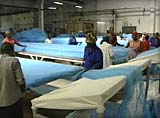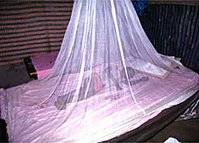Fortunately, world attention is focussed on malaria and a number of international agencies fund programs aimed at reducing the impact of malaria on Tanzania and other countries.
- Life expectancy at birth is 46 years.
- Under five mortality is 112 in 1,000, and malaria is a major cause.
- One fifth (22%) of children are underweight by two standard deviations.
- 30,000 children a year die of malaria.
Insecticide Treated Nets (ITNs) are one of the main weapons against malaria. Large portions of foreign aid are directed towards providing households with ITNs. One successful program in Tanzania provides discount vouchers for pregnant women. These are distributed at local health clinics. This program has had several major benefits:
- Women attend clinics earlier in their pregnancy and so get better health care.
- Private businesses that sell ITNs flourish (economic benefits for community).
- More households have ITNs.
Research has shown that if about 80% of households in a village have ITNs, the level of malaria is almost eliminated because the mosquitos do not have access to infected humans and so cannot transfer the disease. By reducing the number of infected mosquitoes in the environment that are able to transmit malaria, treated nets offer protection up to a range of several hundred metres.
In 2004, 15% of Tanzanian households had an ITN. One goal is that by 2010 80% of children will sleep under ITNs.
If you could protect every child in Tanzania with a treated mosquito net, you could be looking at saving about 30,000 lives a year.
A local textile business in Arusha, A-Z Textiles, has ramped up the production of ITNs to meet the demand created by schemes like the voucher scheme. Last year they produced 1.5million nets.
They say blue is their best-selling colour as it suits the household conditions of the poorest of the poor.
Through education, The School of St Jude aims to improve the lives of children, their families and the nation of Tanzania.
PBS news item on malaria in Tanzania
World Bank report on ITP programs in Tanzania
UK Dept International Development reports on malaria
No comments:
Post a Comment